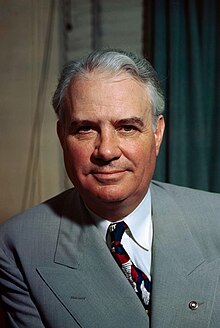
Back جون ويليام بريكير ARZ جان دبلیو. بریکر AZB John W. Bricker German جان دبلیو. بریکر Persian John W. Bricker Finnish John Bricker French ג'ון בריקר HE John W. Bricker Hungarian John W. Bricker Italian John W. Bricker NB
John Bricker | |
|---|---|
 Bricker in 1944 | |
| United States Senator from Ohio | |
| In office January 3, 1947 – January 3, 1959 | |
| Preceded by | Kingsley A. Taft |
| Succeeded by | Stephen M. Young |
| 54th Governor of Ohio | |
| In office January 9, 1939 – January 8, 1945 | |
| Lieutenant | Paul M. Herbert |
| Preceded by | Martin L. Davey |
| Succeeded by | Frank Lausche |
| 32nd Attorney General of Ohio | |
| In office January 9, 1933 – January 11, 1937 | |
| Governor | George White Martin L. Davey |
| Preceded by | Gilbert Bettman |
| Succeeded by | Herbert S. Duffy |
| Personal details | |
| Born | John William Bricker September 6, 1893 Mount Sterling, Ohio, U.S. |
| Died | March 22, 1986 (aged 92) Columbus, Ohio, U.S. |
| Resting place | Green Lawn Cemetery |
| Political party | Republican |
| Spouse |
Harriet Day
(m. 1920; died 1985) |
| Alma mater | Ohio State University (BA, LLB) |
| Military service | |
| Allegiance | |
| Branch/service | |
| Years of service | 1917-1918 |
| Rank | First Lieutenant |
| Battles/wars | World War I |
John William Bricker (September 6, 1893 – March 22, 1986) was an American politician and attorney who served as a United States senator and the 54th governor of Ohio. He was also the Republican nominee for Vice President in 1944.
Born in Madison County, Ohio, Bricker attended Ohio State University and began a legal practice in Columbus, Ohio. He also served in the United States Army during World War I. He held various public offices between 1920 and 1937, including the position of Ohio Attorney General. Bricker served three terms as Governor of Ohio from 1939 to 1945. Bricker was an unsuccessful candidate for the Republican presidential nomination in 1944.[1] He was Thomas E. Dewey's running mate on the Republican ticket in the 1944 election, campaigning against the New Deal and President Franklin D. Roosevelt's judicial nominees. The Republican ticket was defeated by the Democratic ticket of Roosevelt and Harry S. Truman.
Bricker won election to the Senate in 1946. He introduced the Bricker Amendment, which would have limited the president's power to make treaties. Though the Bricker Amendment received support from some members of both parties, it was not passed by Congress. Bricker won re-election in 1952 but was narrowly defeated by Stephen M. Young in 1958. After leaving office, Bricker resumed the practice of law and died in 1986.
- ^ "John Kasich could learn from last Ohio governor to seek presidency". cleveland. July 24, 2015.